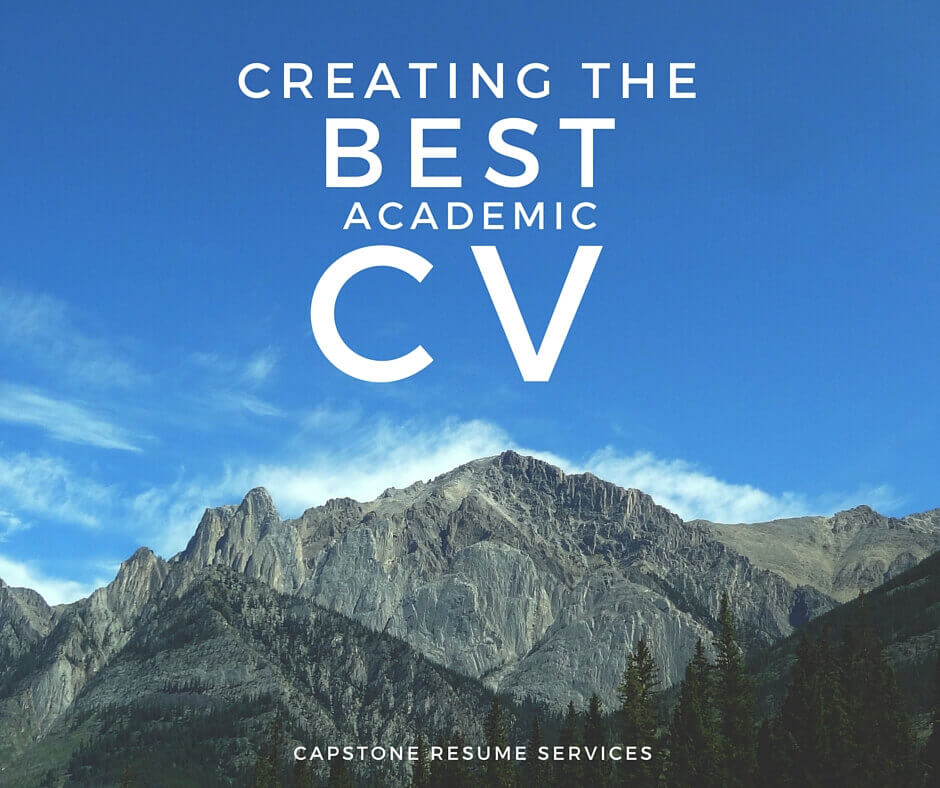
Professionals in American academia need to have a solid academic CV available not just for job hunting, but for applications and consideration for awards, grants, fellowships, public speaking engagements, consultation projects, leadership review, peer review, merit review and tenure consideration. The importance of having an up-to-date academic CV is higher than in most fields.
Whether you choose to write your own academic CV or have Capstone Resume Services take on your project, we encourage you to have it ready at a moment’s notice. Depending on your intended use of your academic CV, some of this advice might be seen as remedial, however, you might pick up a new insightful fact or two along the way.
What is the Difference Between a Resume and an Academic CV?
There are some key differences between an average CV and an academic CV, so let’s look at some of the major ones:
- Academic CVs include many pages of publications that are vital to showcasing one’s experience, research, and publications in the academic field, whereas traditional resumes focus more so on prior work experiences and job skills.
- Academic CVs are geared towards showcasing awards and academic prestige as they relate to contribution to one’s field, whereas traditional resumes read like a marketing pitch for a new job.
- Academic CVs are traditionally long, whereas resumes are short and concise.
What to Include in an Academic CV?
If you are applying for an academic faculty position, your resume focus should emphasize college/university teaching experience, research and publications. Sources in academia suggest that your research is the most important aspect of your CV, so keep this a priority.
If you are applying for a leadership position (executive positions at the university level), your resume might be a hybrid between a professional private-sector resume and an academic CV. The hiring committee is looking for overall organizational leadership within an academic setting. Some of your sections might include bullets like a professional business resume, while other aspects might include classes you have taught or research you have completed.
Since most international job hunters present their professional skills on curriculum vitae and Americans mostly use resumes, it is important to note that this article is written for those needing advice for U.S. academic CV writing. There may also be some variations to make to your academic CV if you are applying for a Canadian, British, or any other country’s academic job opening.
Use Chronological Order for Your Academic CV
For the most part, you should list your most recent accomplishment and go chronologically backward in each section. Make it easy for the hiring committee to read through your resume quickly. Gaps in employment will be obvious considering the level of detail being included. So, don’t try to hide them.
Know That Academic CVs Aren’t Just For Job Applications
You never know what opportunity might pop up and being prepared with a CV in hand is sure to come in handy at some point in your career. Whether you are applying for a position (read the posting thoroughly) or you are submitting your CV for merit-based review or a grant application, you need to make sure it is current and presents your skills and experience in the most up-to-date manner possible.
Most Academic CVs Follow a Structured Format
The following are sections you should include in your academic CV: Career Summary, Education, Publications, Awards, Honors & Recognition, Funding (Grants & Fellowships), Teaching, Admin Experience, Professional Experience, Other Skills & Qualifications, Attendance at Conferences & Seminars, Optional Categories (based on relevance), Non-Academic Work, Professional Skills, Languages, Professional Memberships/Affiliations, Appendices. If you don’t have the skills to place in one area, leave it out.
Navigate Supporting Application Documentation
If you are using your academic CV to apply for a position, the job posting might also ask you to include a cover letter, research statement, teaching statement, sample syllabi, and/or a diversity statement. You might feel that some of these are duplicating what you put in your CV, but not everyone on a search committee gets to see the supporting documents, so your CV should still be your focal point and include all the relevant information you’d like to convey.
Include The Right Keywords
Your CV might be run through an applicant tracking system, so you want to make sure to use some of the same keywords listed in the job description in your resume. To find the best keywords that hiring managers use to screen out unqualified candidates, research your top job descriptions and write down all the words that are most commonly used in the job description and qualification sections. You can then strategically incorporate the keywords in your experience section with tangible results.
Start Building Your CV Even Before You Need It
Leave plenty of time to get your academic CV prepared. You never know when a speaking engagement or a grant application will show up, but having a current professional academic CV on hand will make that process a lot less stressful. Use your rush points to focus on writing the speech or the grant application.
Why Details and Formatting Matter
Academic resumes follow a specific format, for the most part. Be sure to keep the formatting consistent and be sure to double-check for typos or grammatical errors. Showcase your strengths as well as your attention to detail.
The Ideal Length of Your Academic CV
The length of your academic CV should be between 2-4 pages. It will tend to get longer with more experience, but once it hits four pages, it is time to consider abbreviating and editing long descriptions.
Tips on How to Format Your Academic CV

Now that you know what to include in your CV, it is time to package all this information clearly and powerfully. Remember, when you confuse your readers, you lose them, and the point of a CV is to draw in and engage.
Although academia is known for its verbatim and jargon, formatting your CV should take a different route. The point is to make the information easy to scan and engaging enough to pass the selection committee’s criteria within 10 seconds.
To do so, here are some important formatting and stylizing tips that will help you write your academic CV so that it stands out from the rest:
- Use a standard 12-sized font throughout the text with 14-16 sized headings (don’t mix styles and different fonts)
- Stay away from underlining any sections
- Make sure your resume is single-sided when printed out
- Leave a blank line between each heading and the subsequent text
- Use bolding and italics to make certain words or sections stand out (but don’t overdo it!)
- Ensure there is plenty of white space between sections
- Instead of blocks of text, use indented text for a more user-friendly layout
- Stay away from charts, tables, and graphics
- Include keywords that match the position’s description and
- Use a relevant page number and your full name on every page
- Make your CV scannable so that the selection committee could discern right away what experience you have
- Make sure your most current publications are mentioned first
- Ensure that there is no academic jargon or acronyms that could confuse the reader
- Write out any courses you’ve taught, instead of using course codes
- Leave out personal stories or long descriptions of grants, awards, or fellowships
What To Leave Out From Your Academic CV
Like most traditional resumes and CVs, there is certain information that you should leave out from your academic CV. Here are the most important things to remove from your CV to make it more appealing to selection committees:
- Age, ethnic identity, and religious background
- Marital status and sexual orientation
- Height, weight, and physical descriptions
- Photographs
- Hobbies and personal preferences
- Any jobs that are not related to your academic career
And if the process still seems daunting and you would like some additional help, Capstone’s resume writers specialize specifically in academic CV writing. Take advantage of our free resume consultation, where we’ll work together to help you craft a winning academic CV.
Good luck with the process and keep up the great work!

